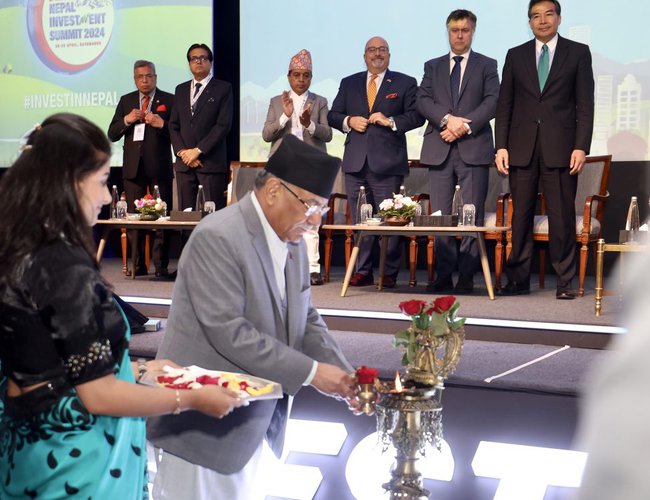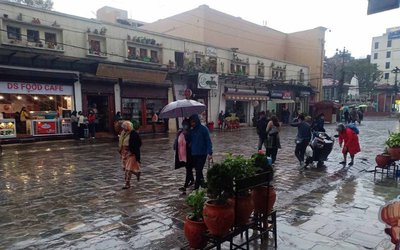
Foreign Direct Investment plays a crucial role in Nepal's economic growth by bringing in capital, technology, expertise, and market access. The Nepal Investment Summit serves as a platform to showcase the country's investment opportunities and address the challenges hindering its economic growth.
The third edition of Nepal Investment Summit, April 28-29, 2024, aims to attract foreign investors, domestic investors, and non-resident Nepalis to Nepal. One hundred and fifty-one projects are being showcased at the Summit ranging from energy, transport, mining and minerals, tourism, agriculture, production, industrial infrastructure and trade, health and education, communications and information technology, water supply, and urban development are set to be showcased.
Nepal presents diverse opportunities across sectors, driven by its natural resources and strategic location. Its unique selling points, including the Himalayan landscape, cultural diversity, adventure tourism, spiritual significance, biodiversity, and hydropower potential, attract investors and tourists alike. These opportunities, coupled with supportive policies and infrastructure development, foster an environment conducive to economic growth. However, addressing challenges like bureaucratic hurdles, infrastructure deficits, and political instability is essential for Nepal to fully realize its potential and achieve sustainable development.
In conjunction with the Investment Summit, I propose that key leaders of political parties undertake joint visits to address crucial issues. Their focus should be on enhancing functionality, expediting project completion, improving market competitiveness, and streamlining decision-making processes.
Pokhara and Gautam Buddha International Airports
- Identify reasons for the non-functionality of international airports.
- Take measures to address operational issues and make the airports fully operational.
National Pride Projects (Hydropower, road, and irrigation)
- Investigate the causes of delays in national priority projects.
- Implement strategies to expedite project completion, ensuring timely delivery of infrastructure and development initiatives.
Open Border and Agriculture Competitiveness
- Assess challenges faced by Nepali agriculture in competing in the market, including issues related to the open border with India.
- Establish quarantine checks and implement measures to enhance the quality and competitiveness of Nepali agricultural products.
Governance and Political Economy
- Investigate reasons for delays and inefficiencies in decision-making processes within government agencies and simplify administrative processes and digitize services.
- Create formal mechanisms for intergovernmental coordination, clearly define the roles, responsibilities, and jurisdictions of each level of government to avoid overlaps and conflicts within the federal system.
- Address the undue influence of trade unions on procurement and decision making.
By addressing these critical issues and implementing necessary reforms, Nepal can enhance its attractiveness to investors, improve infrastructure, promote economic growth, and create a conducive environment for sustainable development. Political leadership and stakeholder collaboration are essential to drive these initiatives forward and realize Nepal's economic potential.
Furthermore, cultivating a culture of efficiency, professionalism, and service orientation within the governance system is vital for mitigating adverse impacts on investment and fostering economic growth. Considering these factors, if Nepal has made substantial progress in policy reforms, maintains relative economic stability, enjoys positive investor sentiment, and aligns with development objectives, hosting an investment summit could indeed be opportune. Such an event has the potential to stimulate investment inflows, strengthen economic expansion, and boost developmental endeavors forward in the nation.
Author: Dr. Prabin Manandhar is an expert in international development. Currently, he is working as the Country Director of Helvetas Swiss Intercooperation Nepal. He is the Former Chair of the Association of International NGOs in Nepal (AIN). He is also a visiting faculty at Kathmandu University and the Tribhuvan University Institute of Crisis Management Studies. The opinions are his own and not that of his employer. He can be reached at prabin.manandhar11@gmail.com
- From Nepal to Myanmar: Navigating Earthquake Response Lessons
- Apr 13, 2025
- World Humanitarian Day 2024: Committing to Peace and Accountability
- Aug 19, 2024
- Investing In Women: Accelerating Progress
- Mar 10, 2024
- Embracing The 'Empty Chair: Advancing Global Inclusivity And Equitable Development
- Dec 29, 2023
- Mental Health In Youth
- Jul 16, 2023















